- Home
- Adam Thorpe
No Telling Page 11
No Telling Read online
Page 11
The man, with one last look through the plate glass, walked across the road and past the metal doors of the depot and then away out of sight.
I decided, after a few moments of reflection, that he wasn’t a sign, and went off to the kitchen where my uncle was halfway across the ceiling with his polystyrene tiles. He was swearing already, and there were bits of polystyrene in his hair. The radio was playing light music, the kind I hated where a few men would sing together on their own, mostly in English. He ticked me off for not helping him, although he’d told me earlier that he didn’t want anybody under his feet. I started to hand the tiles up to him. They were so light I could balance them on two fingers.
‘Why are you doing this?’ I asked.
‘Insulation,’ he said, grunting as he stuck his arms up, pressing a tile to the glue. ‘And it looks nice and pretty. Doesn’t it?’
‘Yes.’
‘Miracle stuff, this. Light as a tart’s feather.’
It was boring, handing up a tile every two minutes. I thought about the man in the homburg hat, the false sign. Jonquille had warned us about false signs, like false Messiahs. ‘Can you imagine, my dears – the Jews still think Jesus was a false Messiah!’ Then someone had asked him how you could tell the difference between a false sign and a true sign, and he had clapped his swollen-looking hand to his chest and said, ‘With your heart. If it has the right measure of faith, my little mushroom.’
What measure of faith had mine got? I was heading towards my Solemn Communion. It was to take place in our local church in May, 1968. This had always seemed a long time off but was now just six months away. I was already going to catechism once a week in preparation. At first it was on Wednesday afternoons, but it had changed to Saturdays. Catechism was run by the younger priest, who liked to illustrate his points with ‘modern parallels’. For instance, if we had sinful ‘interference’ in our thoughts, we just had to retune to find God.
There was a garage further up our road where my uncle would take the Simca to be mended. I would often see a mechanic blowing through a thin tube into a car’s petrol tank; it made me believe, until I was eight or so, that cars ran on air and had to be blown up like balloons. Then my uncle told me it was a way of drawing the petrol out through suction. One day in catechism the young priest talked about the draining of our faith by evil, one of the main evils being Doubt – Doubt draining faith as easily as a mechanic drains a petrol tank.
‘And without petrol,’ the priest said, rubbing his hands in front of the blackboard in the vestry classroom, ‘a car cannot move, can it?’
I pictured the dirty-overalled mechanic sucking on the tube and the tube going into my heart, which I had always pictured as full of faith. I could taste the petrol in my mouth just as I could when standing in a garage – only stronger, much stronger. The mechanic in my mind was the Devil, draining my faith, leaving only Doubt. If, therefore, I was lacking faith, might I not miss – or misinterpret – any sign granted to me? How could I trust, anyway, what I got through my eyes, if my brain had once thought cars were a kind of balloon?
These were the thoughts spilling through my head as I handed up the polystyrene tiles to my uncle. When he got to the edges he used my special cutter I’d been given last Christmas: it was a wire like a cheese-cutter that heated up electrically and went through the polystyrene as if it was snow. You could make wiggly shapes, any shape you wanted, and I had big plans for it. But the batteries were expensive and the polystyrene kept breaking, leaving bits like confetti which got everywhere and were hard to clean up.
‘This,’ said my uncle, who was now finding this out for himself, ‘is one sod of a job.’
I did have sudden bolts of faith, though.
For instance, when visiting poor paralysed Mademoiselle Bolmont a few months earlier, in the summer holidays, I was certain, all of a sudden, that I could cure her just by the touch of my fingers on her legs. It was a divine voice, golden and whispery in my head. The room was stuffy, smelling of talc and sweat, and her ribbony dress was damp at the neck. I was sitting next to her, and managed, after a lot of mental preparation, to brush her knee while reaching for a cake. The hard bony feel of her knee through the satiny skirt made my throat dry up. I coughed; neither my mother nor the chattering Mademoiselle Bolmont took any notice.
She wouldn’t realise, I thought. Her muscles were probably so weak that she wouldn’t realise. But I never had the courage to suggest that she try to stand. We admired her garden through the glass doors.
‘Look at those borders,’ she said. ‘No one to clip the edges for me.’
‘I’m sure Gilles would be happy to,’ my mother suggested.
‘I’ll pay you,’ said Mademoiselle Bolmont, turning to me with bright eyes. ‘What a marvellous idea, Madame Alain.’
‘OK,’ I said.
Nothing came of it, though. A few days later, my uncle appeared in my room and asked me to help him. The Simca’s boot was open and inside it lay Mademoiselle Bolmont’s folded wheelchair. It was like an animal, curled up in sleep. I helped him take it out, my heart thundering with excitement. The wheelchair’s heaviness surprised me.
‘Can she walk, now?’
‘What?’
‘Is she cured?’
My uncle laughed. I could smell Mademoiselle Bolmont’s stuffy, talcy bungalow on the outside air – it was coming off the wheelchair. He unfolded it with a jerk.
‘It’s like a bicycle, it needs a once-over,’ he said, stroking the smooth seat, its leather all scuffed and dark. ‘New ball-bearings, I reckon. She’s got the old spare to be getting on with.’
He parked it in the hall, and as soon as I was alone I bent down and sniffed the seat. If I could have taken clippings of the sweet leathery smell, I would have done so, to keep in my pocket.
My uncle was pressing on a polystyrene tile and murmuring the song by Serge Gainsbourg about the ticket-puncher in the métro making little holes little holes little holes. There was one space a bit smaller than a tile left on the kitchen ceiling but my uncle had miscalculated the number of tiles needed: he was one short. I pointed out the broken-off bits on the floor but he said it would look like a dog’s dinner and that when he did a job he did it properly. He got down off the ladder and lit a cigarette.
‘The thing is, Gilles, your dear mother’s going to complain. She’s not going to say how pretty it looks, ninety-nine per cent done, she’s just going to notice the one per cent that isn’t. That’s the female species for you, chum.’
My mother came in from shopping a little later. She put the heavy bag down on the table. My uncle winked at me.
‘That’s nice, Alain,’ she said, looking up. ‘Why have you left out that bit?’
I decided to ask a friend about the whole business of the sign.
I had only one good friend in Bagneux, in fact. He was called Christophe, and was the son of the local butcher. He had an older brother and two younger ones who were twins; he’d had a little sister, too, but she’d suffocated as a baby under a newspaper.
Christophe had ginger hair and freckles because his mother was a Norman. He drew amazing space-craft with the help of a ruler and compass, as if they were something mathematical. He dressed his hair in a quiff, stiffening it with cream, and buzzed about, even at the age of thirteen, on a mobilette. He went to catechism with me, though he never listened.
I cycled round to Christophe’s and together we rode to our secret place. I had my bicycle with me, so Christophe took his old one instead of the mobilette. A few streets from our road was an old military hospital: it had been empty for a long time. Around the main building was a walled area with big pine-trees. There were some rotting benches and a few patches of grass and a rusty invalid chair. The high brick wall that hid the site was old and crumbling. The fancy wrought-iron gates, with the date 1841 in the middle, had corrugated sheets across them which could be pushed apart just enough to allow a bike through. I never saw anyone else there; there were plenty of other dere
lict sites around for kids and young people. Each time we left we pulled the corrugated iron back so that it looked tight shut.
Christophe and I rode our bikes around inside, as usual. We had made a complicated cycle course between and around the pine-trees, our tyres’ impressions in the carpet of needles marking out the track. We weren’t interested in the building itself, which was very big and had a low prefabricated wing coming out on one side. There was a flight of stone steps up to a locked double door and rows and rows of windows (about fifteen in each row) going up four floors and then a few more sticking out of the roof.
We’d once broken into the hospital, planning it beforehand.
The prefabricated wing had very thin walls, so we just punched a hole bigger and climbed in. The wing had desks and old filing-cabinets spilling out paper, everything tipped over as if someone had got angry. The long corridors and wards in the main building made good echoes, but were ankle-deep in rubbish and plaster and mouldy mattresses. Metal lights dangled above old iron beds and lots of pairs of crutches lay about as though a miracle had just occurred. In one room there were metal cupboards and a sort of long table in the middle with a big light over it; we reckoned this was the operating table. It was covered in dust and bits of plaster and there were thick cobwebs between the legs. There were dark patches on the table’s top we reckoned must be blood. The shutters had fallen off the window so we didn’t need our torches. Christophe lay on the table and I sliced him up with a pretend saw, starting with his leg. Then he did a heart-swap on me, because he was a world-famous surgeon. It was weird, lying back on the operating table and having my heart swapped. Christophe held the new one in his hands and said it was all warm and wet; it had belonged to this really stunning girl aged fifteen. Then he dropped it by mistake and slipped on it and I died.
We went right up to the top rooms; the rain had got in through holes in the roof and Christophe put his foot through a plank. We managed to open a shutter and got a good view where it wasn’t blocked by some flats. Then there was a sudden scratching in the little fireplace by the bed, like a bony hand trying to get out, and we hurried away. There were so many doors and corridors that we nearly couldn’t find our way back down again, as if we were in a maze. It all smelt very bad, mainly of cats’ piss – and there was a grinning skeleton of a cat in one of the rooms. The thick circle of dust around it must have been its body. We kept thinking of the soldiers’ corpses hiding in the rooms we didn’t go into. One room had pictures of Jesus and Mary painted on the walls and an altar at one end, so we guessed it was the chapel. We descended into the kitchens and found huge ovens with old copper pans inside and piles of rusty tins. There were spiders’ webs everywhere and then we saw, by the light of the torch, the biggest spider we’d ever seen in our lives.
We hardly went inside again, keeping to the grounds under the pine-trees.
There were better spots around Bagneux, of course. There were still some meadows and woods and a big area of market gardens full of crows and even a few real fields around the last farms. The nearest fields, about two kilometres away, had disappeared a year or so ago under some giant white shoe-boxes.
For my school holiday work, I’d had to prepare a lecture and a short essay on ‘an aspect of local heritage’, and I’d chosen the old military hospital. There was a book in the library called Souvenirs d’un soldat with some photographs of the hospital in 1870, crowded with soldiers from the same war against the Prussians that Gigi had mentioned. The soldiers were standing about under the trees or lying on old-fashioned beds with wheels. A lot of the faces were blurred because they’d moved while the camera was taking the photograph. Some of them had a bandage on their head or their arm in a sling, or were leaning on a stick. Their uniforms looked too big for them and quite a few had empty sleeves or trouser-legs.
It was weird seeing the hospital as it used to be, the same but also completely different. It didn’t look very new in the photograph, though: in fact, it was dark and stained, as if blackened by smoke. There were flowers in beds around the edge and pots on the stone steps. There were ghostly faces in the windows – nurses, they looked like. The trees were much smaller and thinner but I recognised some of them from their position, and they had nice wooden benches under them. The paths were neat and had little white hoops either side; they were now just bumps in the ground. Christophe and I had uncovered one of them from under its mould of pine-needles, and it was all rusted.
Instead of the prefabricated wing, there was what looked like a vegetable garden; blurred men were in it, digging with spades. Behind these men was a stone wall and behind the wall were trees and sky instead of flats: I knew from another book in the library, an ancient one with fold-out maps, that Bagneux was a little village then, and that there was nothing around the military hospital but fields and orchards. This was impossible to imagine, but I felt something warm and sweet, like a breeze from Heaven, pass through me when I was looking at the map, trying to imagine it, trying to picture all the secret places there must have been in the woods and fields and orchards, all the adventures I could have had if I’d been a boy back then.
This ancient book was about the battle that had taken place in and around Bagneux and Châtillon – an unimportant battle no one now knew about, apparently (not even our teacher). I imagined some of the wounded must have come from this battle, and wrote a short piece on it for another essay, copying it almost word for word from the book. I added a short paragraph about Gigi’s bullets and bayonet blade and finger-bone and received top marks, for once.
When I showed my mother the essay about the old hospital, she said I’d turn into an expert. I never told her that I spent a lot of my time in its grounds.
I was definitely Christophe’s best friend, although he was a member of a gang I had nothing to do with. The gang didn’t know about the old military hospital – they hung around the market gardens or behind the railway station. Anyway, he was sworn to secrecy, like me. It was our own secret republic.
Christophe was wondering, while we were cycling around the pine-trees, why I had such big dandruff. I told him it was polystyrene. We sat down where we usually did – on the roots of the largest pine.
‘You know babies?’ I said.
‘Yeah.’
‘Do they still kill unwanted ones, these days?’
‘What do you mean? Abortion?’
‘What’s that?’
‘Making angels,’ Christophe said, in a silly high voice.
‘That’s when God reaches down and transfers it to Heaven, before it’s come out of the tummy and into sin.’
‘It doesn’t come out of the tummy,’ he snorted.
‘It does. It comes out of the tummy-button.’
‘Eh?’
He looked at me with such astonishment that I went bright red.
‘You don’t really think that, do you?’
‘I don’t know,’ I said. ‘I just thought it.’
I tried to recall some of the pictures I had come across now and again in Carole’s friends’ flats, but they were mostly swirly drawings of tarts with huge bosoms sitting on dragons or motor-bikes or flowers.
‘My God,’ Christophe said, ‘you don’t know anything.’
‘I’ve drunk hashish, loads of times.’
‘Yeah?’
‘Yeah.’
‘What’s it like?’
‘Not bad,’ I said, shrugging my shoulders. ‘Not bad, man.’
Christophe laughed.
‘I drank it with this American guy,’ I went on. ‘He showed me where Baudelaire lived. He was OK. He was a mate of Bob Dylan’s,’ I added, not certainly enough.
‘So? My mum once saw Dawn Addams.’
I hadn’t heard of Dawn Addams. Christophe began to poke at the pine-needle stuff with a stick, tearing it like a skin. It was black underneath. The sun came out, a deep autumn gold falling over everything like a blessing.
‘It comes out of the fanny,’ he said.
‘The
fanny?’
‘You know what a fanny is?’
‘Yeah.’
I was in a cold sweat.
‘Well, it comes out of there, between the legs. Where the prick goes in, it comes out.’
‘The same place?’
‘Yeah. My dad once served B.B. some boudin blanc. B.B. for B.B.’
‘Crap,’ I said.
‘No one believes him, that’s the trouble. They think he’s telling a dirty joke.’
I was trembling invisibly all over, trying to absorb the shock of it, because I knew Christophe wasn’t having me on. I wondered whether I wasn’t mistaken about a lot of things, things everyone else knew about as if they’d been born with the knowledge or had soaked it up from the air.
The fanny! All I knew was that it was a kind of hole. I hadn’t ever wanted to know more. It seemed all wrong, that a baby the size of Nicolas could fit through a fanny. The hole, I thought, must be very large, thinking of Nicolas’s head. Then why doesn’t a woman’s insides drop out when she stands up? Is there a sort of gate? Or can she close it like a mouth? I wanted to ask Christophe lots of questions, but didn’t dare. The best thing would be not to think about it, not until I was married and had to think about it. Everyone else coped, and so would I.
‘Why do you want to know about killing babies, mate?’
‘Nicolas. They don’t want me to go and visit him.’
‘What, you think he’s been bumped off?’
‘Dunno.’
‘My sister was suffocated under a newspaper.’
‘I know,’ I said.
‘Before I was born. Two or three years before. It was an accident. She rolled over on the sofa when my mother was in the kitchen and she got caught up in the newspaper. Le Figaro. My dad’s never taken it since.’

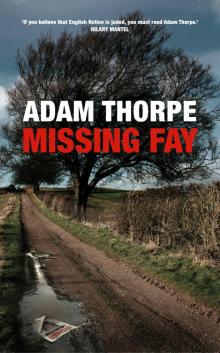 Missing Fay
Missing Fay Hodd
Hodd Pieces of Light
Pieces of Light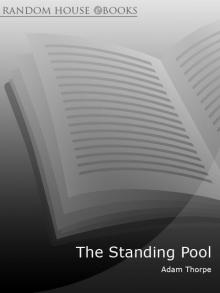 The Standing Pool
The Standing Pool Ulverton
Ulverton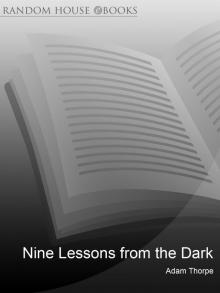 Nine Lessons From the Dark
Nine Lessons From the Dark Flight
Flight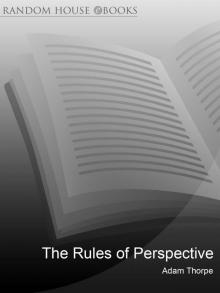 The Rules of Perspective
The Rules of Perspective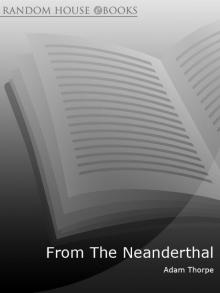 From the Neanderthal
From the Neanderthal Is This the Way You Said?
Is This the Way You Said?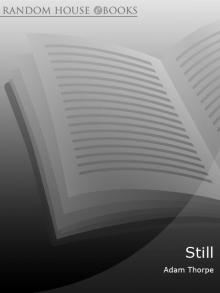 Still
Still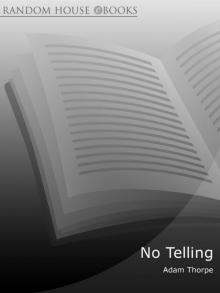 No Telling
No Telling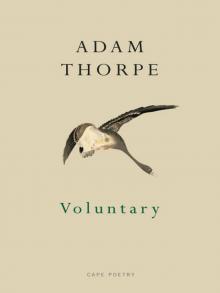 Voluntary
Voluntary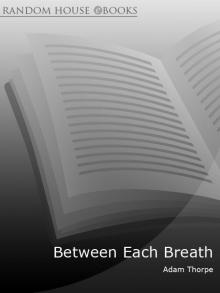 Between Each Breath
Between Each Breath